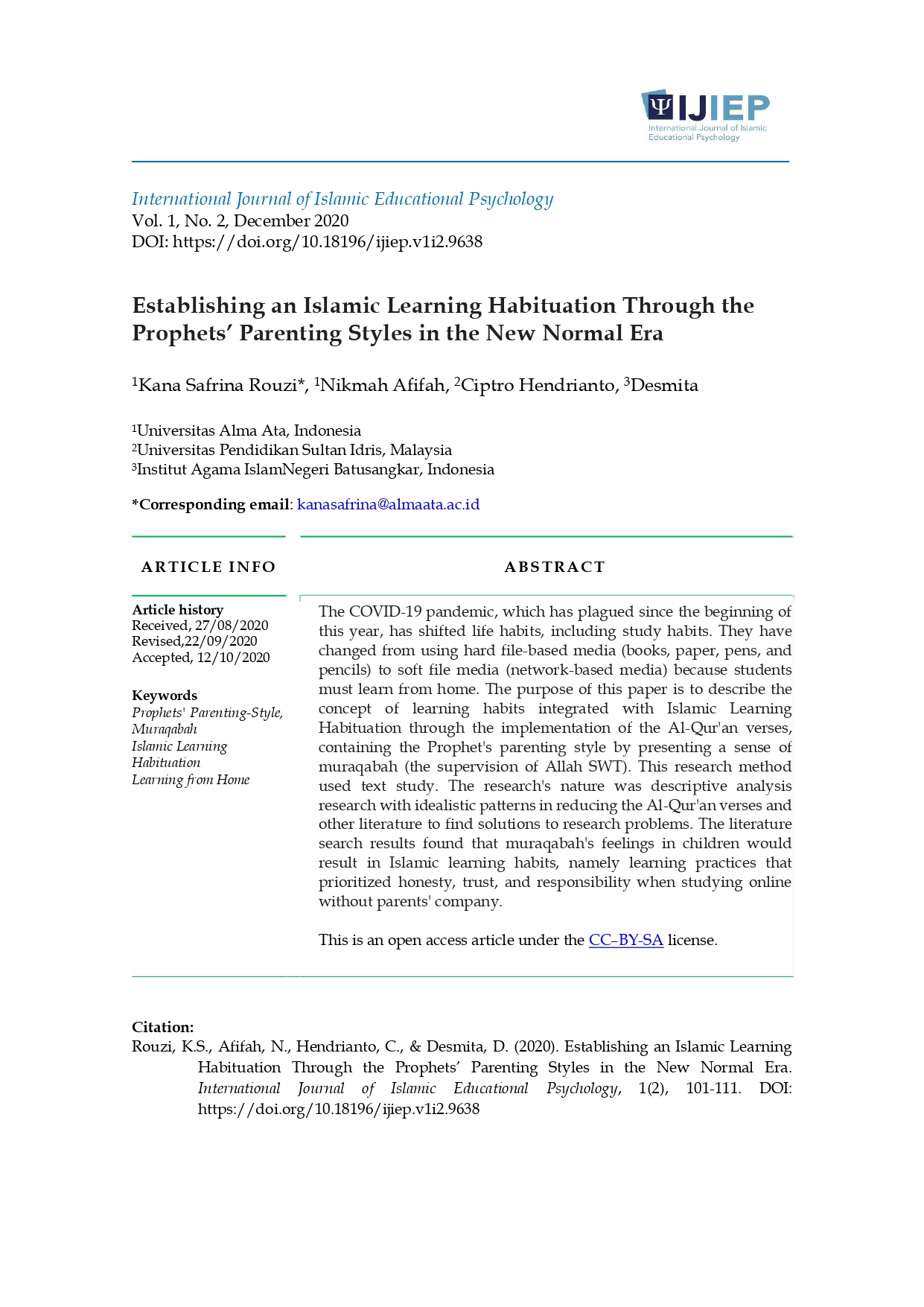Establishing an Islamic Learning Habituation Through the Prophets’ Parenting Styles in the New Normal Era
DOI:
https://doi.org/10.18196/ijiep.v1i2.9638Keywords:
Prophets' parenting-style, Muraqabah, Islamic Learning, Habituation, Learning from HomeAbstract
The COVID-19 pandemic, which has plagued since the beginning of this year, has shifted life habits, including study habits. They have changed from using hard file-based media (books, paper, pens, and pencils) to soft file media (network-based media) because students must learn from home. The purpose of this paper is to describe the concept of learning habits integrated with Islamic Learning Habituation through the implementation of the Al-Qur'an verses, containing the Prophet's parenting style by presenting a sense of muraqabah (the supervision of Allah SWT). This research method used text study. The research's nature was descriptive analysis research with idealistic patterns in reducing the Al-Qur'an verses and other literature to find solutions to research problems. The literature search results found that muraqabah's feelings in children would result in Islamic learning habits, namely learning practices that prioritized honesty, trust, and responsibility when studying online without parents' company.
References
Abdullah Nashih Ulwan, (1993), Pedoman Pendidikan Anak Dalam Islam Jilid I- III, terj. Saifullah Kamalie, Semarang: Asy-Syifa’
Abu Ja’far Muhammad bin Jarir Ath-Thabari, (2009), Tafsir Ath-Thabari Vol. 21, terj. Misbah, Jakarta: Pustaka Azzam
Al-Ghazali, (1967), Ihya Ulumuddin, Juz Iii, Beirut: Muassasah Al-Hilby
Ali, W. (2020). Online And Remote Learning In Higher Education Institutes: A Necessity In Light Of Covid-19 Pandemic. Higher Education, 10(3).
Al-Maghribi Bin As-Said Al-Maghribi, (2007), Begini Seharusnya Mendidik Anak: Panduan Mendidik Anak Sejak Masa Kandungan Hingga Dewasa, terj. Zainal Abidin, Jakarta: Darul Haq
Andriyani, I. N., Wasim, A. T., Zainuddin, M., & Fitriah, M. S. (2020). Gadgets Playing Behavior Of Students In Indonesia. Humanities & Social Sciences Reviews, 8(1), 264-271.
Aunurrahman. (2010), Belajar dan Pembelajaran, Bandung: Alfabeta
Brooks, Jane, (2011), The Process of Parenting, terj. Rrahmat Fajar, Yogyakarta: Pustaka Pelajar
Earhart, J., & Zamora, I. (2015). Achievement Together: The Development of an Intervention Using Relationship-Based Strategies to Promote Positive Learning Habits. Infants & Young Children, 28, 32–45. doi:10.1097/iyc.0000000000000023
Holilulloh, A., & Youssef, B. N. (2020). The Learning Process Through Social Media For Children: The Issues And Challenges Of Children’s Future. Scaffolding: Jurnal Pendidikan Islam Dan Multikulturalisme, 2(1), 58-67.
Kapasia, N., Paul, P., Roy, A., Saha, J., Zaveri, A., Mallick, R., ... & Chouhan, P. (2020). Impact Of Lockdown On Learning Status Of Undergraduate And Postgraduate Students During Covid-19 Pandemic In West Bengal, India. Children And Youth Services Review, 105-194
Kholifah, N., Supriyadi, S., & Suwaro, S. (2019). Hubungan Persepsi Peserta Didik Tentang Pola Asuh Orang Tua, Kebiasaan Belajar Dengan Hasil Belajar. Jurnal Inovatif Ilmu Pendidikan, 1(1), 83-98.
Lavenda, O. (2011). Parental involvement in school: A test of Hoover-Dempsey and Sandler's model among Jewish and Arab parents in Israel. Children and Youth Services Review, 33, 927-935.
Lei, Y., Wang, J., Dou, H., Qiu, Y., & Li, H. (2019). Influence Of Typicality In Category-Based Fear Generalization: Diverging Evidence From The P2 And N400 Effect. International Journal Of Psychophysiology, 135, 12-20.
M. Suud, Fitriah et al. (2020), The Role of Islamic Counselling in Pandemic COVID 19: A Conceptual Study for Developing Positive Emotion of Parents and Children. Konseling Religi Jurnal Bimbingan Konseling Islam, v. 11, n. 1, p. 18-35
Melnyk, M., & Yevseiev, S. Сyber Safety Prevention Methods For Children. Modern Problems Of Computer Science And It-Education, 132.
Muhibbin, Syah. (2000). Psikologi Pendidikan Dengan Pendekatan Baru. Bandung: Remaja Rosdakarya
Mujib, A. (2017). Pengembangan Psikologi Islam Melalui Pendekatan Studi Islam. Jurnal Psikologi Islam, 1(1), 17-32.
Munawar, M., & Nisfah, N. L. (2020). The Effect Of Assertive Discipline On Early-Aged Children’s Gadget Addiction. Jecce (Journal Of Early Childhood Care And Education), 2(2), 64-70;
Nathanson, A. I. (2018). How Parents Manage Young Children’s Mobile Media Use. Families and Technology, 3–22. doi:10.1007/978-3-319-95540-7_1
Noehi Nasution. (1998). Materi Pokok Psikologi Pendidikan. Jakarta: direktorat Jenderal Pembinaan Kelembagaan Agama Islam dan Universitas Terbuka
Noeng Muhadjir, (1998), Metode Penelitian Kualitatif Edisi III, Yogyakarta: Rake Sarasin
Olaseni, V. M., & Olaseni, A. O. (2020). Covid-19 Pandemic: Impact of Socio-Demographic Factors and Parent’s Life Orientation on Enforced Learning in Pupils During Lock-Down in Nigeria. An International Multidisciplinary Double-Blind Peer-reviewed Research Journal. Special Issue, Volume II Issue IV May 2020
Raymond J. Corsini, (ed), (1994), Encyclopedia of Psychology 2nd Edition Vol.3, New York: John Wiley & Sons
Rochman Natawidjaja & L. J. Moleong. (1979). Psikologi Pendidikan Untuk. SPG. Jakarta: Mutiara Slameto.
Rohman, M., Marji, D. A. S., Sugandi, R. M., & Nurhadi, D. (2020). Online Learning In Higher Education During Covid-19 Pandemic: Students’ Perceptions. Journal Of Talent Development And Excellence, 12(2s), 3644-3651.
Schmidt, J. R., De Houwer, J., & Moors, A. (2020). Learning Habits: Does Overtraining Lead to Resistance to New Learning?. Collabra: Psychology, 6(1), 21. DOI: http://doi.org/10.1525/collabra.320
The Liang Gie. (1995). Cara Belajar yang Efisien, Jilid II Edisi keempat. (diperbaharui). Yogyakarta: Liberty
Tim Ar-Rahman, (2017), Ensiklopedia 25 Nabi dan Rasul, Jakarta: Erlangga
Wood, W., & Rünger, D. (2016). Psychology of habit. Annual Review of Psychology, 67, 289–314. DOI: https://doi.org/10.1146/annurev-psych-122414-033417

Downloads
Published
How to Cite
Issue
Section
License

- Share — copy and redistribute the material in any medium or format
- Adapt—remix, transform, and build upon the material for any purpose, even commercially.
The licensor cannot revoke these freedoms as long as you follow the license terms. Under the following terms:
- Attribution: You must give appropriate credit, provide a link to the license, and indicate if changes were made. You may do so in any reasonable manner, but not in any way that suggests the licensor endorses you or your use.
- ShareAlike: If you remix, transform, or build upon the material, you must distribute your contributions under the same license as the original.
- No additional restrictions — You may not apply legal terms or technological measures that legally restrict others from doing anything the license permits.






